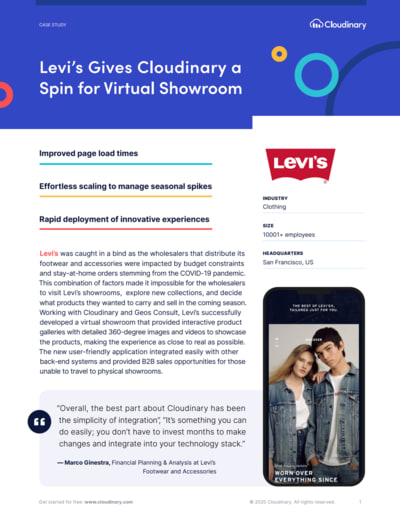Levi’s Footwear & Accessories is a division of Levi Strauss & Co., a major apparel company and a global leader in jeanswear, which also designs and sells casual wear and related accessories for men, women, and children under the Levi’s®, Dockers®, Signature by Levi Strauss & Co.™, and Denizen® brands. Levi Strauss products are sold in more than 110 countries through chain retailers, department stores, online sites, and approximately 3,200 retail stores and shop-in-shops.
Over the past months, due to business lockdowns and stay-at-home orders that stemmed from the COVID-19 pandemic, Levi’s wholesale distributors (wholesalers for short), such as Farfetch, saw a steep dive in revenue and, in turn, a sharp reduction in their travel budget. Accordingly, those wholesalers could not make in-person visits to Levi’s showrooms to review new collections and identify the merchandise to carry and sell in the coming season.
In short order, Levi’s collaborated with Cloudinary and IT consulting firm Geos Consult to build a user-friendly app—a virtual showroom filled with interactive product galleries in which to showcase products with detailed 360-degree images and videos. Easily integratable with other back-end systems, the app has proved to be an excellent alternative for brick-and-mortar marketplaces for B2B transactions.
This post describes the major issues Levi’s faced at the start of the development project, the joint solution from Geos Consult and Cloudinary, and the remarkable end-product with its impressive benefits.
Right off the bat, Levi’s set a high standard for user friendliness. Gaetano Curci, the company’s creative manager, global consumer marketing, explained why: “An engaging and interactive user experience affords buyers an in-depth understanding of the products that are for sale, such as what constitutes the fabric and how the apparel or accessories look when worn.”
Given the anticipation that wholesalers would visit this virtual showroom for seasonal collections, a major requirement was that the showroom must be able to handle continuous updates to the tune of an 40,000 new image uploads per season and display them quickly and efficiently. In a nutshell, a responsive, anticipatory, and compelling user experience is a must.
Levi’s also desired that the virtual showroom be easy to administer and seamless to integrate with other e-commerce and resource-management platforms, as well as business and reporting tools.
To meet those requirements, Geos Consult recommended that the virtual showroom operate on a digital asset management (DAM) platform called G-image, which manages and processes images and videos with Cloudinary behind the scenes.
Tailored specifically for the fashion industry, G-image relies on Cloudinary’s simple and efficient capabilities for managing images and videos and then delivering them in an optimized format to all devices and viewports regardless of bandwidth. Cloudinary quickly became a preferred platform for Levi’s because the optimization and integration features offered by other content delivery networks (CDNs) did not meet the Levi’s standard.
The media-management workflow, powered by G-image and Cloudinary, comprises three main steps:
- Levi’s uploads images of its collections to G-image, which then stores those media in Azure, meticulously categorized and named according to a standard convention that distinguishes the products and their key features.
- With Cloudinary’s automated features, Levi’s transforms the images for optimal display in the company’s various applications, including the B2B platform and Salesforce Commerce Cloud.
- Through Cloudinary’s other automated capabilities, the Levi’s design team transcodes the images to the most efficient format based on the content and viewing browser, adjusts the compression quality, and adapts the resolution to fit all viewports. A rewarding outcome emerges: the product galleries along with all the images load fast and responsively.
Managing videos follows a similar process, culminating in a smooth streaming experience in the virtual showroom on Cloudinary’s customizable video player.
“Overall, the best part about Cloudinary is its simplicity of integration,” said Marco Ginestra, financial planning and analysis manager at Levi’s. “It’s truly easy; you don’t have to invest months to fix things and fold them into your technology stack.”
Since launching the virtual showroom, Levi’s has been continually adopting new trends and technologies. An example is 360 spinners, which display products from various angles, enabling virtual interaction with and evaluation by the wholesalers. Creating a 360-degree spin set requires 25 named images of each product, numbered correctly for rendering in the right order. Cloudinary’s dynamic manipulation capabilities were instrumental in helping Geos Consults generate that real-life view fast: it takes only about an hour to produce and activate a spin set in the virtual showroom.
“Cloudinary’s partnership offers us a powerful way to smoothly deploy our G-image solution for the fashion market,” said Matteo Sangiorgio, CTO at Geos Consults, adding that improved page-load times and scalability—in particular to meet the demands of seasonal spikes—are the top two benefits that lead to gratifying user experiences.

